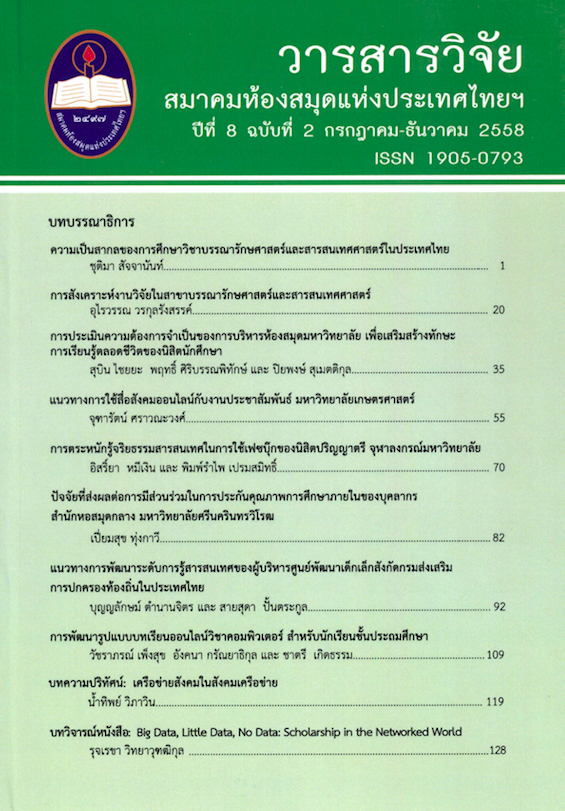แนวทางการพัฒนาระดับการรู้สารสนเทศของผู้บริหารศูนย์พัฒนาเด็กเล็ก สังกัดกรมส่งเสริมการปกครองท้องถิ่นในประเทศไทย
Main Article Content
Abstract
การวิจัยครั้งนี้เป็นการวิจัยแบบผสานวิธี (Mixed Method Research) มุ่งศึกษาแนวทางพัฒนาระดับการรู้สารสนเทศของผู้บริหารศูนย์พัฒนาเด็กเล็ก สังกัดกรมส่งเสริมการปกครองท้องถิ่นในประเทศไทย กลุ่มตัวอย่างเชิงปริมาณ ได้แก่ ผู้บริหารศูนย์พัฒนาเด็กเล็ก จำนวนทั้งสิ้น 368 คน ส่วนกลุ่มตัวอย่างเชิงคุณภาพที่ใช้ในการวิจัยครั้งนี้ ได้แก่ ตัวแทนกองการศึกษา สังกัดกรมส่งเสริมการปกครองท้องถิ่น ผู้เชี่ยวชาญด้านสารสนเทศ และตัวแทนผู้บริหารศูนย์พัฒนาเด็กเล็ก ภูมิภาคละ 2 คน จาก 4 ภูมิภาคได้แก่ ภาคเหนือ ภาคกลาง ภาคตะวันออกเฉียงเหนือ และภาคใต้ รวมทั้งสิ้นเป็นจำนวน 24 คน เครื่องมือในการวิจัยเชิงปริมาณ คือ เป็นแบบสอบถามเกี่ยวกับแนวทางพัฒนาระดับการรู้สารสนเทศของผู้บริหารศูนย์พัฒนาเด็กเล็ก สังกัดกรมส่งเสริมการปกครองท้องถิ่นในประเทศไทย และนำข้อมูลเบื้องต้นของข้อเสนอแนะมาเป็นแนวทางในการสร้างเครื่องมือเชิงคุณภาพ ซึ่งเป็นข้อคำถามเพื่อประกอบการสัมภาษณ์เชิงลึก การวิเคราะห์ข้อมูลใช้สถิติ ร้อยละ ค่าเฉลี่ยและส่วนเบี่ยงเบนมาตรฐาน ผลการวิจัยสรุปได้ดังนี้ สภาพการรู้สารสนเทศ ความต้องการรู้สารสนเทศ สภาพปัญหาและอุปสรรคในการรู้สารสนเทศของผู้บริหารศูนย์พัฒนาเด็กเล็ก สังกัดกรมส่งเสริมการปกครองท้องถิ่นในประเทศไทย พบว่า ผู้บริหารส่วนใหญ่เป็นหญิง มีอายุ 41-50 ปี มีการศึกษาระดับปริญญาตรี และมีประสบการณ์ในการปฏิบัติงานในศูนย์พัฒนาเด็กเล็ก มากกว่า 15 ปีขึ้นไป ในด้านสภาพการรับรู้สารสนเทศ พบว่า ส่วนใหญ่มีพฤติกรรมการรับรู้สารสนเทศ โดยดูข่าว/สารคดีทางทีวีที่บ้าน สืบค้นและใช้ข้อมูลจากอินเทอร์เน็ตจากที่บ้าน/ที่ทำงาน และคุยเรื่องงานกับเพื่อนร่วมงาน มีวัตถุประสงค์ในการรับรู้สารสนเทศเพื่อให้ทันต่อเหตุการณ์ เพื่อการศึกษาค้นคว้าเพิ่มเติม และเพื่อใช้พัฒนาอาชีพ รับรู้สารสนเทศประเภทสิ่งพิมพ์ด้านการบริหารงานองค์การบริหารส่วนตำบล จากอินเทอร์เน็ต โทรศัพท์มือถือและนิตยสาร/วารสาร รับรู้สารสนเทศประเภทบุคคล จากเพื่อนร่วมงาน ปลัดองค์การบริหารส่วนตำบล และครู/ครูใหญ่/ผู้อำนวยการโรงเรียนรับรู้สารสนเทศประเภทสิ่งพิมพ์จากรายงานหรือเอกสารของทางราชการ เอกสารเกี่ยวกับกฎหมาย และข้อบังคับต่างๆ ระเบียบปฏิบัติงาน ด้านระดับการรู้สารสนเทศ พบว่า มีระดับการรู้สารสนเทศด้านเด็กปฐมวัย ด้านการศึกษา ศาสนา วัฒนธรรม และเพื่อติดตามข่าวสารข้อมูลที่ทันสมัย ด้านความต้องการสารสนเทศ พบว่า ต้องการสารสนเทศด้านเด็กปฐมวัย ใช้เพื่อการบริหารและการจัดการ เช่น จัดทำงบประมาณ การวางแผน ด้านสภาพปัญหาและอุปสรรค พบว่า เครื่องคอมพิวเตอร์สำหรับใช้งานมีไม่เพียงพอ ผู้รับผิดชอบด้านการส่งเสริมการรู้สารสนเทศมีจำกัด
Information literacy level for development guidelines of child-care managers in early childhood centers of local government in Thailand
Boonyalak Tumnanchit1
Saisuda Puntrakool2
1M.Ed. (Educational Technology), Assistant Professor, Department of Library and Information science, Suan Dusit Rajabhat University.
2M.A. (Library and Information science), Assistant Professor, Department of Library and Information science, Suan Dusit Rajabhat University.
This research has been conducted by 2 mixed methods, aiming at developing the guidelines on information literacy level of the child-care-center managers of Thailand’s Local Government. Based on the study design, the quantitative samples consisted of 368 child-care managers; and the qualitative samples for the investigation were collected from 4 regional areas; Northern, Central, North-eastern, and Southern totally 24 key respondents for qualitative investigation. The quantitative instrument was formulated in form of questionnaire concerning development guidelines on information literacy level of the child-care managers, and as such, being primary data subsequently suggested to formulating a suitable qualitative instrument, which were applied as the guidelines for in-depth interview. As for the quantitative analysis, the SPSS computer-based program was statistically engaged in percentage, means, and standard deviation. The research findings were revealed as follows: Referring to the acquisition of information literacy, information requirement, and problems and obstacles of the child-care managers’ performance, most of the managers were female, aged 41-50, bachelor graduated, and have experienced in working at a certain early childhood center for over 15 years. To the acquisition of information literacy, mostly were found as in the perceptive behavior in current- news-and-features TV watching at home, surfing on the internet both at home and the office, have a work-related discussion with their colleagues to update their information, extensive study on particular issues as well as on career development, acquiring current news of the sub-district administrative organizations (Au-Bau-Tau) on the internet, via cell-phones, magazines and journals; sharing personnel information with their colleagues, Permanent Secretary of the sub-district administrative organization, teachers, school principals, and school directors; acquiring any government’s published documents concerning legal issues, rules and regulations and procedures; and a variety of paper dissemination, such as brochures and leaflets. Regarding the information literacy level, the investigation reveals that most of the respondents have perceived in a variety of topics, such as early childhood development, education, religions, culture, and any other related news. As for information requirement, the study reveals that early childhood matters are top needed, mainly applied to their managerial skills, such as budgeting and planning. As for problems and obstacles, there have been lacked computers promptly available and IT skilled persons/experts.
Article Details
บทความทุกเรื่องที่ลงตีพิมพ์จะได้รับการตรวจอ่านโดยผู้ทรงคุณวุฒิ ความคิดเห็นและบทความที่ปรากฏในวารสารนี้ เป็นของผู้เขียนซึ่งมิใช่เป็นความคิดเห็นของคณะผู้จัดทำ และมิใช่ความรับผิดชอบของสมาคมห้องสมุดแห่งประเทศไทยฯ การนำบทความในวารสารนี้ไปตีพิมพ์ซ้ำต้องได้รับอนุญาตจากคณะผู้จัดทำ
All articles submitted for publication will be reviewed by the academic reviewers. The editorial board and TLA claim no responsibility for the content or opinions expressed by the authors of individual articles or columns in this journal. Reprinting of any articles in this journal must be permitted by the editorial board.


